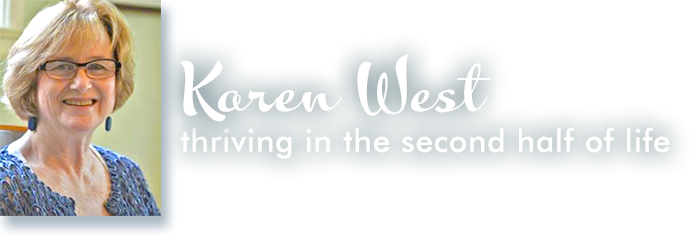As I move on from the topic of life review to the topic of forgiveness, I immediately think of my father who died about twenty years ago. The last time I talked to him on the phone when he was in the hospital across the country, he had only one question for me. He wanted to know if he had controlled me. Knowing what he wanted me to say, I said, “Yes, Dad you did.” He responded by saying, “Good. I thought I did.” I then asked if he wanted me to come to see him, and he indicated that it wasn’t necessary. He died while still in the hospital shortly after our “conversation.”
 It had never occurred to me that I should try to forgive my father. We had never had what I would call a relationship, so once he was gone, I thought that was the end. My father had never shown any desire to have me forgive him, and I wasn’t at all surprised by his last words to me. Then I became a Certified Sage-ing and I learned how crucial it is to forgive. I learned that If you don’t forgive someone, you are choosing to remain a victim. I’ve always been sad that I didn’t get to have a relationship with a loving father, but I never thought of myself as a “victim.”
It had never occurred to me that I should try to forgive my father. We had never had what I would call a relationship, so once he was gone, I thought that was the end. My father had never shown any desire to have me forgive him, and I wasn’t at all surprised by his last words to me. Then I became a Certified Sage-ing and I learned how crucial it is to forgive. I learned that If you don’t forgive someone, you are choosing to remain a victim. I’ve always been sad that I didn’t get to have a relationship with a loving father, but I never thought of myself as a “victim.”
In the book “Legacies of the Heart: Living a Life That Matters,” Meg Newhouse says that forgiveness is “not about accepting abuse, and it’s not about altruism.” She quotes what palliative-care physician Ira Brock writes in his book The Four Things That Matter Most. He says,”You may be entirely justified in hating the person who abused you, but that hate keeps you chained to the person you despise.” (65)

I was surprised to learn that “Forgiveness primarily benefits the one doing the forgiving. According to research conducted by the Mayo Clinic, people who have forgiven have significantly improved their physical, social, psychological, and spiritual well-being, as measured by ‘lower stress levels and heart rates, less hostility, fewer anxiety and depression symptoms, a reduction in chronic pain, lower risk of alcohol or substance abuse, and healthier relationships and more friendships.’ You forgive so you can free yourself from the burden of carrying grudges—from the obsessing that keeps your mind unprofitably occupied, from the anger that raises your blood pressure and cortisol levels, and from the victimhood that gives control of your life to the other person or to your inner critic.” (65–66)
And being a “victim” saps the energy that we could be putting to much better use. In his book From Age-ing to Sage-ing, Rabbi Zalman Schachter-Shalomi says when I refuse to forgive someone, I sentence them to prison, and “now as jailer and warden, I must spend as much time in prison as the prisoner I am guarding. All the energy that I put into maintaining the prison system comes out of my “energy’ budget.” (98)
Perhaps my father saw it as his job to “control” me, and because he was my father, perhaps I allowed him to control me more than I should have, but I now realize I can make a choice to take back control. As Harold Kushner says in Nine Essential Things I’ve Learned About Life, I can stop him from “living in my head.” And I agree that “Letting go is the best reenge. Forgiveness is the identifying marker of the stronger party to the dispute. It is truly a favor you do yourself, not an undeserved gesture to the person who hurt you. Be kind to yourself and forgive.” (75)
Every now and then we hear stories in the news about remarkable instances of people forgiving. Two that really touched me were the nine people who forgave the white supremacist who sat with them in their bible study group at Emanuel African Methodist Episcopal Church and then shot them in 2015, and a woman named Mary Johnson, who forgave the 34-year-old man Oshea Israel, who had shot her son when he was 16. Not only did she forgive him, she now lives next door to him and calls him “son.” Until I started reading about forgiveness, I definitely admired these people, because they show so much compassion for the people who hurt them. Now I realize that they were also showing compassion for themselves too.


6 thoughts on “Why Should I Forgive My Dad?”
I needed to forgive my mother. I was angry with her for what I didn’t get from her as a mother. When I allowed myself to see that she did the best she could do, given her upbringing and circumstances, I had compassion for her and was able to forgive her. Forgiving her has been a journey of stages, like grief, but frees me from the anger, resentment and victim hood that built up and weighed me down for so many years. Mostly, it has allowed me to be lighthearted, less judgmental, more compassionate, allowing me the freedom to live a better life.
Thank you, Mary, for sharing something about your personal experience. I’m hoping that more people will do that too, because we can all learn from each other.
Karen, I appreciate your sharing about your father.
Thank you for sharing your appreciation, Teresa.
So beautifully said, Karen
Thanks, Pat. Has there ever been someone in your life that you forgave more for yourself than for that person?